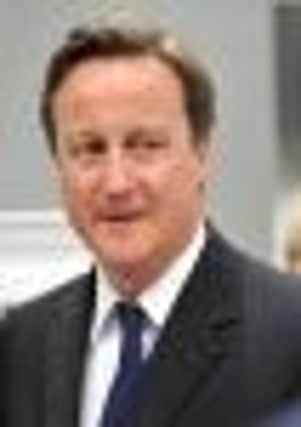Bill Adams: Cameron still talking Big but achieving little


If public services had to be cut then community and charities would not just fill the gap, but do it both more efficiently and imaginatively.
The claim was that the Big Society would be better and cheaper. And anyway, even if there were difficulties, we were all in it together.
Advertisement
Hide AdAdvertisement
Hide AdIt has not turned out that way. None of these promises have been kept. Most collapsed shortly after the election. The VAT increase, hitting those on middle and low incomes, show how unfair coalition policies can be.
David Cameron appeared on posters saying he would cut the deficit not the NHS, but the Government has spent £800m less on the NHS.
The Big Society was the vaguest pledge. No one can object to policies that strengthen voluntary groups and encourage us to get involved. But that does not happen spontaneously. Someone needs to organise it, and while you can get volunteers to take on some tasks, ensuring that services are delivered every day and to people who might not be that grateful needs the continuity that can only come from employing people.
If the Big Society was going to work, it would therefore need extra resources. We would therefore expect funding for charities and voluntary groups to be going up. Yet as the new research from the TUC-backed website False Economy shows – www.falseeconomy.org.uk – the opposite is the case.
Advertisement
Hide AdAdvertisement
Hide AdAcross England more than 2,000 charities are facing budget cuts as local authorities reduce their funding – or in some cases completely withdraw it.
Charities are facing net funding reductions of more than £110m this year, though the final figure is likely to be far higher, given that some large authorities have not yet finalised where the cuts will hit.
Our region has not been spared. Freedom of Information requests show that Bradford is cutting support for voluntary groups by more than half a million pounds – nearly nine per cent. North Yorkshire is making big cuts to 14 charities. Barnsley is cutting 35, while in Sheffield 140 charities are hit.
Just to take one of these, you cannot get a better engine of the big society than Voluntary Action Sheffield as it promotes volunteering and community action. Its grant has been cut by £135,000, almost a quarter, between last year and this.
Advertisement
Hide AdAdvertisement
Hide AdUndoubtedly some councils have behaved badly, and local people have rightly been angry at cuts to much valued local services. But we should be clear that the real villains are the Government.
Of course, we cannot ignore or deny the deficit, but trying to eliminate it in just four years and mostly by spending cuts is not just cruel, but unlikely to work.
The main cause of the deficit is the collapse in tax income caused by the recession. Getting people back to work and the economy growing again is the way to close this gap. Slashing spending is a false economy because it puts people out of work, hits consumer and business confidence and means that the economy will continue to bump along the bottom, failing to generate the tax revenue that will close the deficit in the long term.
What is worse is that Ministers have piled an unfair proportion of the cuts onto local councils, and in the hope that voters have short memories, have taken more this year than planned in future years. Councils have been put in an impossible position, and have had to make some horrible choices about where to find deep cuts quickly.
Advertisement
Hide AdAdvertisement
Hide AdSome politicians are open about their calls to shrink the state and cut services. Already they have launched their campaign to cut the 50p tax rate paid by those earning more than £150,000 a year – paid for in part by these cuts to charities and community groups.
But such policies have never won an election, and were kept secret before the last. And so many of these cuts are a false economy within a false economy. If you cut help to unemployed young people, you just build up other problems that will cost more in the future. If you slash help for problem drinkers, then more crime gets committed and there is more domestic violence, although Sheffield have cut Womens’ Aid too. Less support for carers means more people end up in hospital.
It is time for a new approach. The deficit is a symptom of a much wider set of problems – growing inequality, too much power for finance, not enough investment in manufacturing and an unfair tax system that lets too many big companies and rich individuals get away with dodging their fair share. We should tackle the root causes, not one symptom with a cure worse than the disease.
Bill Adams is the regional secretary of the Yorkshire and the Humber TUC.